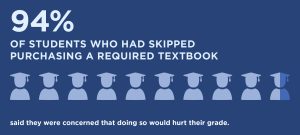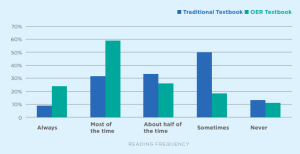Why are OERs Important?
It is not uncommon for students to opt out of purchasing a textbook for a class. As the cost of education rises, many students have a hard time getting aid, and affording the steep cost of higher education.

Majority of students who opt out of purchasing a textbook are concerned about their ability to do well in the class because of their inability to afford the materials. Beyond just the student’s grade, their understanding of the course and knowledge they are gaining may not be as in depth or comprehensive as it would be had they been able to use the proper material for the class. This will not only affect them during their time at school and their mastery of their other related courses, but also will affect their success in their career.

Students who have had the opportunity to use OERs in their courses overall had positive experiences, noting the quality, value, and method of delivery OERs added to their courses.

Being unable to afford textbooks for class is a major cause of stress for many students, and up to 82% of students showed up to the first day of class without the textbook because they were unable to afford it. Up to 58% of students didn’t purchase a textbook, and claimed that the lack of materials hurt their performance in the course.

Students who has access to OERs (specifically students who are already inclined to utilize the reading materials offered for their courses) were more likely to read and use OERs than they were to use textbooks.

